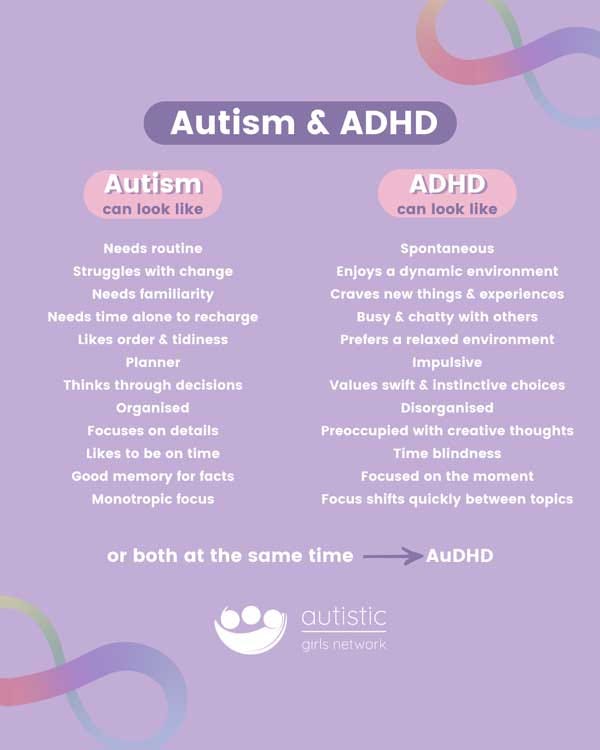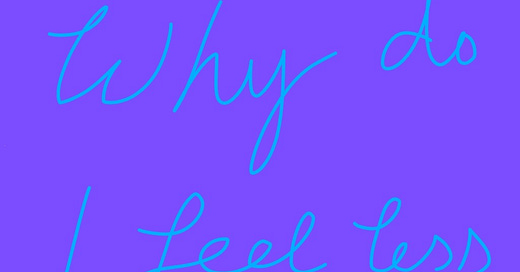The Competence Illusion (or, why I'm a better driver now)
Lately I feel less Autistic and ADHD than I did, join me in wondering why.
There was a period, just before and after I was diagnosed autistic and ADHD, where I stopped pushing myself. Not in a dramatic way. Just a gentle backing off - like turning down the volume on certain ambitions, certain expectations. I told myself I was being kind. I think I was being kind. I needed a break! Because life, up until that point, had been exhausting.
I wonder also, if I’m honest, if it was a sort of giving up.
At one point, I recall I was considering giving up driving altogether, for instance. I found it so stressful. The multi-tasking, navigating; the fact I get lost 98% of the times I get into my car. My inability to leave enough time to have relaxing journeys, let alone give myself extra time to accomodate all these challenges…
Maybe I’m just not a person who should drive, I thought.
I started to imagine a life where I just… didn’t. No driving. No big social events. No challenging commitments. A smaller life. A manageable one. One I could survive without constantly failing. I actually tried to create this, after I got sober. Stripped everything back. But I still felt overwhelmed and anxious and stressed-out. Worst of all, I had no way of managing my hectic brain. The endless rumination! And no outlet! (Thanks for reading, lads.)
The funny thing is, a few years on from diagnosis (OMG, four. Wtf.) And I drive all the time. I drive to work, to Body Pump (yep, I’m a Body Pumper), to soft play, to friends’ houses. I don’t love it, and I still get lost, often, and I still don’t leave at the right time, even if I have worked out what time that should be. But I do it, frequently without panicking or getting worked up. Occasionally, I even enjoy it!
Am I cured now? Or fixed? Am I neurotypical, after all? Or is driving alone such a luxury since entering the Realm of the Hungry Baby that it feels as such? I like to think it’s down to how I’ve changed my expectations of myself. I know I’m going to get lost. So when I do, the inner dialogue of What the fuck’s wrong with you? isn’t quite so vicious.
(Or maybe it just hasn’t happened recently, The Mega-Stress, because its term time and so I’ve got a pretty strict routine, and I’ve not had to do something new. Either way, I’m in a good routine, for the moment, and it’s illuminating…!)
What I do know is that when I first got diagnosed, I felt less capable. Like all the things I found hard were now officially Hard, capital H, and I didn’t have to pretend otherwise. But slowly, something else crept in. Acceptance, maybe. A kind of self-respect. An ability or willingness to meet myself where I am, admit and begin to attempt to figure out what support I might need. Not that there is much for such a ‘high-functioning’ late-diagnosed adult, but from family and friends and myself. Local organisations like Bristol Autism Spectrum Service, BASS.
I’ve read a lot, and educated myself, and crucially, I’ve lowered the bar. It’s not that I’ll never try anything difficult again, but I want to make the conditions fairer in the meantime. And I want to focus more of my attention on doing the things that come easier. Like lying down. And eating. And playing with the baby and my other beloveds. And writing.
The more I’ve adapted my life around what I know about my brain, the less chaotic and neurodivergent I feel. Lately, I feel less autistic and ADHD now than I did before I was diagnosed. Or less disabled, I suppose.
And I guess this fits with Judith Singer’s model of neurodiversity as a difference rather than a disorder. I previously felt more disabled because I was focused on fixing myself, rather than looking to how my environment could better support me. I might still have a slightly individualistic slant on that. Okay, I haven’t (yet) read enough Judith Singer.
What’s changed is that my ‘symptoms’ for want of a better word aren’t constantly flaring because of unmet needs, overpushing myself, and stress explosions. I used to think I was just bad at life. But I was mostly just exhausted. And sensitive. And hangry. And unable to tolerate stress. (Basically a legend.)
Another thing that’s shifted - maybe the biggest thing - is that I trust myself (more) now. Not trusting myself was one of the things that led me to look at my drinking. Staying up late and getting hungover did not help my struggles with the simple tasks of daily life. I was very flaky and unreliable. I am still chronically forgetful, but I just can’t hold it against myself. I just can’t.
For decades I used alcohol to help me relax, to self-soothe, to get me in the mood for socialising, to give me the courage to walk into a meet-up at the pub. And it worked! Until it didn’t. Or perhaps until I wanted other things…
Looking back, so many of the things I blamed on drinking - the anxiety, the messiness, the lost time and things - were actually me trying to manage my neurodivergence with an ineffective tool. In the beginning, it felt like alcohol helped me cope. It made me feel normal, i.e. ‘neurotypical’ (whatever that means) or extroverted, which genuinely felt like a requirement. Social, chatty, confident. But also, it helped me ignore myself. To not get to know or understand who I really was. To lose touch with my inner barometer that tried to keep me safe and lead me to happiness.
Sobriety and diagnosis arrived within a few years of each other, and they both helped so much.
Before I understood I was Audhd/Auti-dhd/Autistic and ADHD, I often felt useless. Like I was constantly dropping the ball or being the ball that someone else had to carry. (Hi T! <3) I second-guessed everything: my instincts, emotions, even the things I was good at. Especially the things I was good at. Because if I could write a novel or lead a seminar or entertain a room full of people, why couldn’t I keep hold of my keys and phone or answer important messages or enjoy time with dear friends without feeling extremely anxious and emitting anxiety stench?

Diagnosis didn’t give me all the answers, but it gave me a new lens to understand myself. A new perspective. Over time, that perspective - and the new choices it allowed for - became a kind of foundation. I stopped assuming the worst about myself. I started noticing all the invisible work I was doing just to appear “fine” - and slowly, I stopped doing so much of it. I reorganised my life not to require so much of it.
I could be totally wrong, but I feel more capable now. I don’t waste so much energy pretending I’m not struggling. So I can use that energy in better ways. I can laugh more, because I’m not tensed up, and trying too hard to be something I’m just not.
At first, post-diagnosis, my relationships suffered. I felt angry - with other people, with the world, with myself. I was defensive, brittle, full of a painful longing and regret. How long I had lived without self-understanding! It must be someone’s fault. But I grew up in the 90s, girls like me simply didn’t get diagnosed then. It was literally impossible that my parents or teachers could have known. The knowledge simply wasn’t around.
The more I understand myself, and the more I stop comparing myself to an invisible idealised and impossible template - the mystical neurotypical! (Increasingly, it seems that this person doesn’t exist…) - the more my life improves.
I don’t expect to be calm and pleasant if I haven’t eaten. I aim to carry snacks and water whenever I leave the house (sometimes I even remember to do so.) I build recovery time into my calendar along with social events (still double-book but progress not perfection). I outsource or ask for help, or admit The Thing is just Beyond Me right now. I try not to let this make me a horribly selfish friend/daughter/colleague (work-in-progress, that.)
I gave up the exhausting job of pretending to be fine - and suddenly had enough energy left over to just… function.
So yep, I drive more now. I do more. And I cope a little better with the unreasonable demands of life in the 21st Century. I’m not broken or special or fragile. Not incapable, incompetent or useless. Just a person. With a brain. That needs certain things to work well.
I have self-understanding. And it can keep growing if I can keep paying attention. And I’m grateful for that.
📉 What did you used to push yourself to do that you’ve now made more gentle or doable or given up completely?
🥤 If you quit drinking (or anything else that used to be a crutch), what came into your life in its place?
📚 Chelsey Flood is the author of award-winning novels Infinite Sky and Nightwanderers, and a senior lecturer in creative writing at UWE. She is currently working on a book for Jessica Kingsley Publishers about the connection between undiagnosed neurodiversity and addiction + her first domestic noir. 📚





I stopped drinking nearly 22 months ago and it brought to me the knowledge of how I used alcohol to be a “better” version of myself which I now understand meant the more neurotypical acting version.
I have stopped pushing myself to do that and begun accepting who I truly am - I am quiet, I don’t like parties or nights out, I love nights in. I get excited when Bake Off or Gladiators or Taskmaster starts. A good weekend for me is the only plan being watching a wrestling PPV on a Saturday night.
I still feel that grip of shame when someone asks “What did you do at the weekend?” Because I still feel like I should have had some grand plans. But, I’m working on it.
Hey Chelsey, long time no see. I hope you're grand. Really enjoying the blog, it's all very relatable. I received my AuDHD diagnosis a few years ago now. Lots of things fell into place. Especially regarding my relationship with alcohol. Anyway, these days I have side hustle running neuro-inclusive club events. They aren't 100% sober but they aren't messy either and alcohol certainly isn't centered. We have our first ever Bristol event tomorrow night at the Beacon. Silent Disco, table-top gaming, Calm Space etc. Not sure if it would be your bag but if you like the sound of it give me a nudge and I'll pass on a code for free tickets. Cheers. Byron